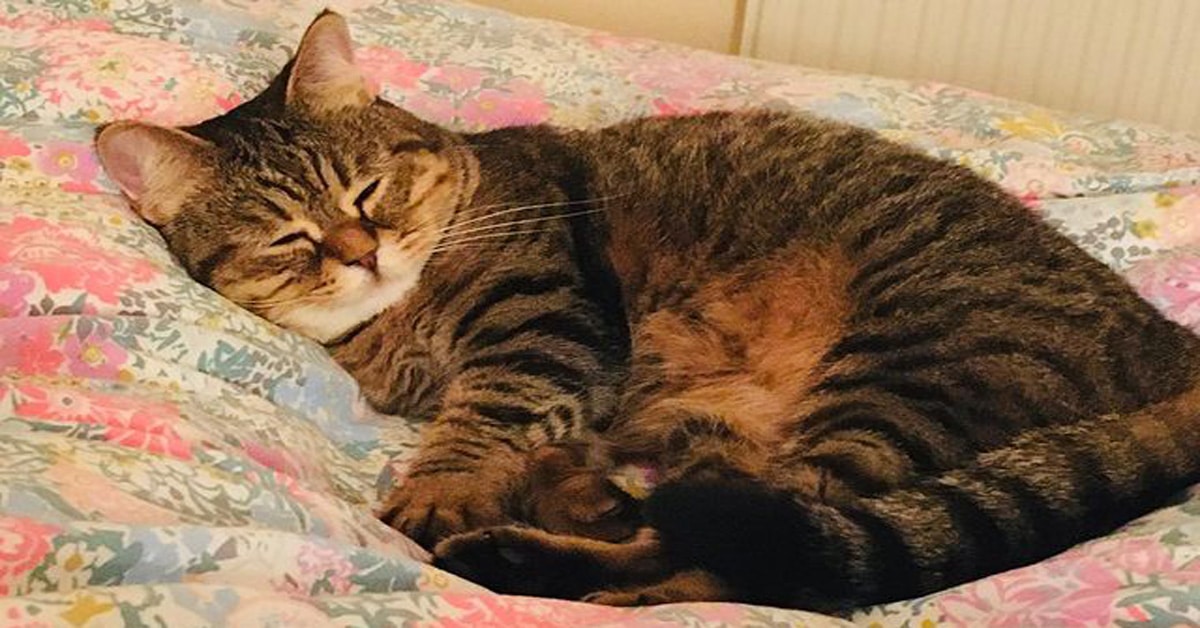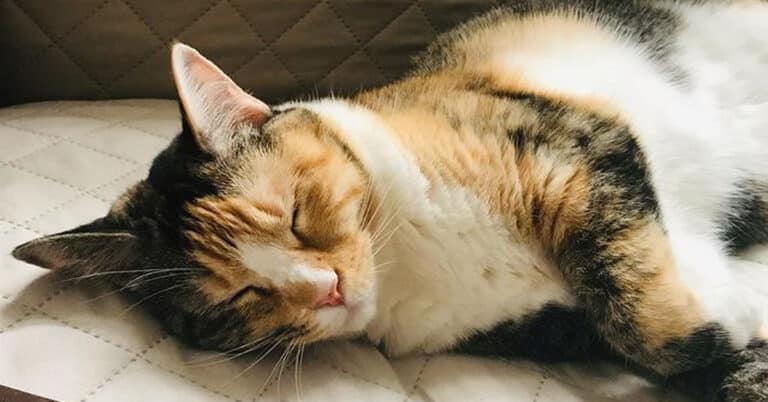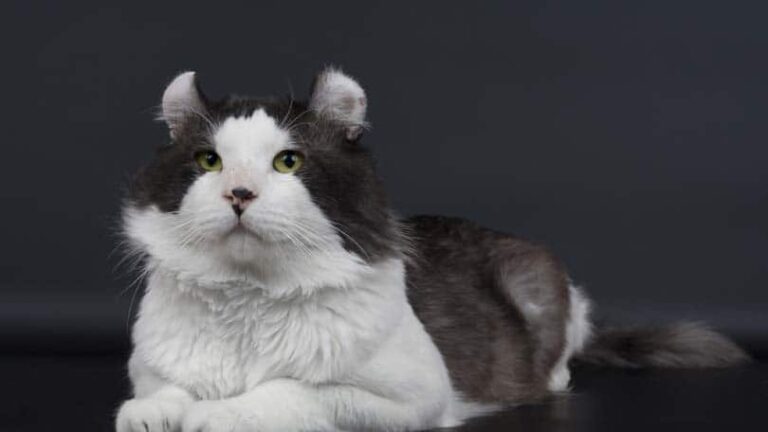Where Your Cat Sleeps On Your Bed and What It Means
Cats usually demonstrate their aspirations and feelings through a variety of expressive behaviors and facial reactions. However, due to the mystery surrounding their way of expressing themselves, it can be difficult for us to fully comprehend what they are trying to say.
Although it’s widely acknowledged that felines are fond of curling up on their owners’ beds, have you ever wondered what it means where your cat sleeps on your bed?
Let’s explore the underlying meanings behind this fascinating behavior and discover more about the stunning communication style that gives the feline world its true majesty!
Where Your Cat Sleeps on Your Bed – 3 Meanings
1. Near Your Head
According to biological proof, the average body temperature of a cat is 102 degrees Fahrenheit, which is far warmer than our average temperature of 98.6 degrees. Considering cats don’t have as many heat sensors as humans do, your warmth-seeking companion will probably rely on external heat sources to keep themselves warm.
Therefore, while you are asking yourself what the meaning of where your cat sleeps on your bed is, it should come as no surprise that since cats are attracted to warmth when they sleep, the internal heat generated by your head might be offering your feline an incredibly appealing spot to fall asleep.
Your head provides the place where the majority of your body heat flows while you sleep, and since your cat can’t rest comfortably under the cover, they may decide that your head is the most comfortable spot to sleep on. Additionally, compared to other parts like your legs, which you can unintentionally move throughout the night and unconsciously interrupt your cat, your head is far less inclined to move.
2. On Your Feet
Wild cats have distinct characteristics compared to domestic cats. However, domestic cats frequently exhibit comparable tendencies to wild cats. As a result, cats have a preference for lying up above the ground so they can be aware of their surroundings and keep an eye out for both prey and predators. It enables them to fully assess the environment.
Similarly, when they are curled up next to your feet, they can watch the entire space since they are in a position from which they can observe everything and even have a path of escape if necessary.
Cats are known to be responsive to their humans’ emotions and comfort, in addition to feeling secure. Consequently, when you are concerned about the meaning of where your cat sleeps on your bed, you should comprehend that if you observe that your cat prefers to curl up next to your feet and purr before sleeping, it’s probable that your cat attempts to help you feel better by showing a straightforward expression of love and affection.
3. Under Covers
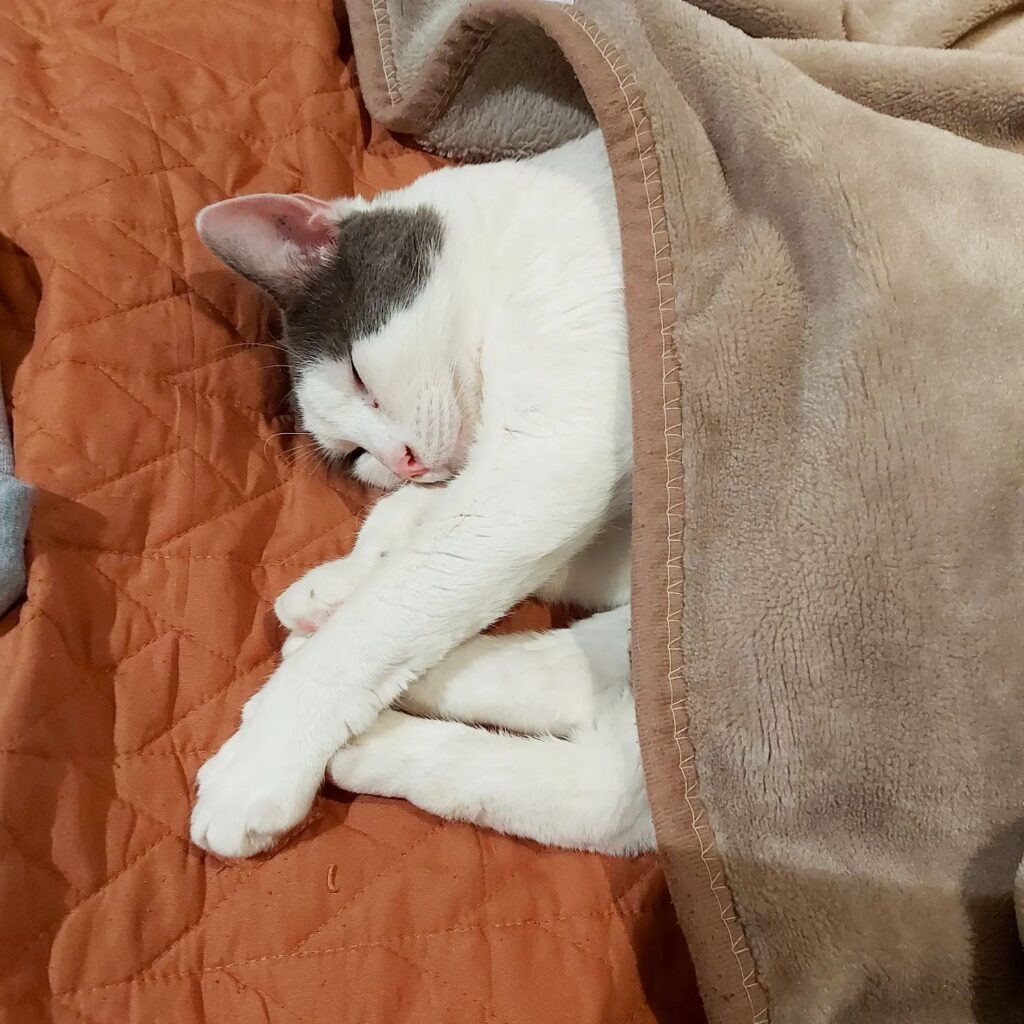
If your cat prefers to sleep alongside you under the blankets, then you should unquestionably accept this decision as a feline compliment!
The undercover space may be a favorite sleeping spot for your cat, considering it keeps them cozy and comfortable. Cats are naturally curious, so while you are trying to identify where your cat sleeps on your bed, your cat may discover resting beneath the covers is an entirely novel experience.
Under the covers, your cat can construct his tent, which may seem like a haven from threats. Additionally, it is stated that the cat’s tension is decreased by the blanket’s small pressure on its body.
Possible Reasons Behind Cat Sleeping on Your Bed
While you are attempting to discover an explanation for the puzzling behaviors of cats, we are delighted to satisfy your curiosity and even point out that you need to investigate the matter thoroughly. Therefore, to make your journey into the feline world even more fascinating, we have gathered the 5 most prevalent reasons behind where your cat sleeps on your bed.
1. Affectional Instincts

Cats find emotional comfort in your presence. Therefore, sleeping close to you can be a sign that your cat feels a strong attachment to you. This can be explained by the fact that cats in the wild will curl up together to sleep, fostering their sense of familial unity.
The person who feeds the cat keeps the litter box clean and offers them the greatest amount of affection will typically earn the cat’s favor since they perceive a need to be near the person who takes care of them.
Therefore, if you find yourself wondering where your cat sleeps on your bed and what it means, you need to know that this behavior is a gesture of devotion from your cat, indicating that they consider you a member of their family. By sleeping on their owners’ beds, cats express devotion and replicate their instincts of affection.
2. Comfort and Warmth
Cats are fond of relaxing physically and making themselves extra comfortable by sleeping in your bed. Since their temperatures are significantly higher than ours, cats are more comfortable when their core body temperature is maintained.
Therefore, even though they can control their body temperatures through cognitive and physical processes, sleeping on your bed is an excellent way for cats to stay warm.
3. Enhanced Quality of Sleep
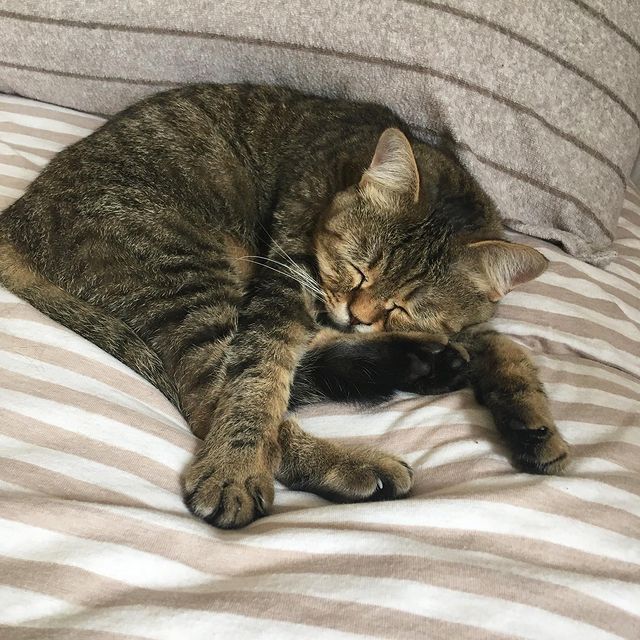
Even though domestic cats aren’t concerned with becoming prey in indoor environments, they generally sleep lightly to defend themselves due to their instincts. While kittens may sleep right next to their mother to fall asleep quickly and deeply, adult cats tend to curl up with their owners to experience high-quality sleep.
Cats need to sleep longer and more deeply because, during this stage, their bodies can recover, develop, and grow. This gives them more energy and makes them feel awake and mindful.
4. Sense of Security
In the wild, nighttime is an especially vulnerable phase, so your cat may naturally want to cuddle up close, considering that he trusts you. Therefore, to feel comfortable, they look for additional safety which allows them to be exposed without fear of being in danger.
Cats are more secure when they stay near you at night because they know they can defend you and awaken you if they notice any threat. Perception of safety relies on the cat’s mindset since some cats prefer to sleep above the covers so they can react promptly if necessary, while others remain under them for security.
5. Emotional Balance
Even though your cat resting on your bed may be considered normal behavior, if you intend to carefully explore the meaning of where your cat sleeps on your bed, it’s crucial to be aware that there may also be alarming causes.
Stress or medical conditions may be the cause of a cat’s fear of being separated. A stressed-out cat may become more dependent and possessive, trying to sleep as close to you as possible. Your cat may experience discomfort and anxiety as a result of even minor variables like new cat food or an alternate kind of litter, so it’s important to identify and manage stress whenever feasible.
Since we have addressed the most prevalent reasons behind cats’ enigmatic behavior, you now have a comprehensive understanding of the most common places where your cat sleeps on your bed.
Advantages of Letting Your Cat Sleep on Your Bed
We previously addressed the most interesting interpretations of places where your cat sleeps on your bed. Now, let’s provide an explanation that comprehensively demonstrates how amazing the benefits of allowing your cat to lie on your bed are.
A thorough investigation by researchers from Minnesota University revealed that having a cat as a bed companion may lower the likelihood of heart attacks. Additionally, sleeping with your cat may enhance the quality of your sleep, ultimately enhancing your general physical and mental health, as your pet’s aroma and warmth can reduce stress.
You may effortlessly fall asleep to the sound of a cat purring, and the sensation of their bodies resting up against yours can add to the feeling of calmness. Additionally, sleeping next to your cat is a great way to strengthen your connection with your cat, which is crucial since it fosters trust and can help prevent behavioral problems.
Therefore, while you are asking yourself what’s the meaning of areas where your cat sleeps on your bed, it should come as no surprise that due to the unconditional affection toward felines, even in ancient times, several well-known historical personas, such as Alexander the Great and Mary Queen of Scots, allowed their cats to sleep with them.
Since a complete understanding of the hidden reasons behind cats’ nonverbal communication style will persuade us of how fascinating felines are, the answer to your original inquiry, “Where your cat sleeps on your bed, and what it means?” apparently becomes clear.
Final Thoughts
You are now aware of an array of widely accepted concepts to address the true meaning of where your cat sleeps on your bed. With this article, we aimed to emphasize how felines’ independent nature imparts an impression of excitement to their behavior as they communicate in unpredictable ways and have enhanced sensations of affection.
Now that you know where your cat sleeps on your bed and what it means, you’ll even be qualified to answer questions from other cat parents about this intriguing concern!

Nato is a content writer and researcher with a background in psychology who’s eager to explore the wonders of nature. As a travel enthusiast and animal lover, she hopes to inspire others to discover and cherish the beauty and importance of the natural world.

